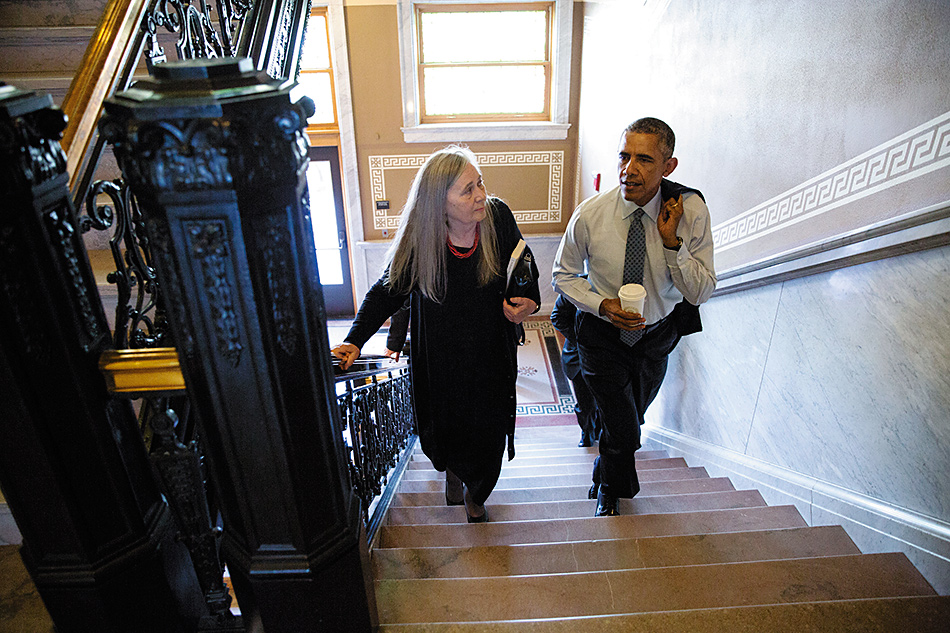There’s something extraordinarily slow and all-encompassing about Marilynne Robinson’s writing style–so much so that you’re directly transported into her line of thought. Her contribution to The Nation’s upcoming issue on Obama’s presidency sojourns through her many beautiful thoughts on the president, who interviewed her at Iowa State Library last year. Read Robinson in partial below, in full via The Nation.
The success with which Barack Obama has been estranged in the minds of many Americans, made to seem foreign on precisely the grounds that made him singularly qualified for his office, reflects a refusal to accept what America is: not only a multiethnic and multiracial nation but a pervasive cultural and economic presence in the world, with responsibilities equal to our influence—a daunting thought. We are mighty and the world is, in every way, fragile. Tact and restraint, where possible, are indicated. But we—politicians, journalists, cultural figures—do little to encourage a temperament suited to our role.
The growing din of our politics, and of the media fantasists who create terrifying worlds of threat and deceit and who increasingly shout down our politics, is not likely to yield a mature consensus about our role and our obligations. It is true historically that Americans in meaningful numbers have mocked and bedeviled our great presidents. They, being great, have tended to do good things for good reasons, and therefore to be able to answer reasonable criticism. This fact has led their detractors to resort to a scurrility potent in its time: Abraham Lincoln was mixed-race, Franklin Roosevelt was Jewish. And now Barack Obama is Muslim. This notion, given force by the insistence of those who propagate it, is that Islam itself is evil and full of insidious intent, as Judaism was said to be in the 1930s by those who wished to discredit Roosevelt. The object in every case is to instill the belief that a great deception has been carried out, that the true character and motives of the president are sinister, that his government is illegitimate and must be opposed. I do not share the exceptionalist or providentialist belief that malicious behavior—outright slander—is somehow vindicated by the fact that we have survived it so far. I don’t accept the view that playing on prejudices is just another part of the political give-and-take. I think history has indulged us, allowing us to get away with abusing the democratic system in ways it will not sustain forever. Would anyone object to what I have said here? Well, in fact, Barack Obama would object.
It is a remarkable thing to have some meaningful conversation with a president of the United States, in this case a man young enough to be my son. Barack Obama is gracious, poised, and intense in the face of concerns and demands I cannot imagine. There is a sentence in a benediction common in mainline churches like his and mine: “Return no one evil for evil, but in all things seek the good.” It seems to me always that his remarkable dignity and resilience must have its source in a transvaluation of this kind. He is extraordinarily alert. His attention runs a little ahead of the moment, to the next question, to the courtesy or reassurance he thinks the moment might be about to demand of him. It must be clear to anyone who has read his books that he is eager to learn from any encounter that might yield insight into a kind of query he brings to experience, which is, I think, an openness to an extremely inductive understanding of value, one which he is always ready to expand and refine. Though he would not apply such words to himself, the president is a philosopher, perhaps a theologian.
In the land of the blind, the one-eyed man might seem delusional. There are risks in having an interesting mind in this odd climate we have made for ourselves. There are risks also in being in fact faithful to the faith so many of us claim. The president is taken in some quarters to be non-Christian because he is disinclined to hate his enemies. This can only mean that an uninstructed and unreflective “Christianity” has indeed taken hold in the population. The wrath of man worketh not the righteousness of God, according to the Epistle of James. But we have lived for years with the raucous influence of self-declared Christians who are clearly convinced that their wrath and God’s righteousness are one and the same. Then when the president, though he is insulted, balked, and provoked, refuses to yield to anger, his self-possession is apparently unreadable. A considerable part of the population must have ceased to recognize and respect piety, not to mention simple dignity.
President Obama would say that my thinking is far too harsh, distracted by the nonsense of the moment, and that the essential thing, the thing that always wins out finally, is the goodness and wisdom of the American people. Only confidence in the ultimate wisdom of the people makes democracy sustainable through crises. The dynamic of the system assumes dispute and contentiousness, but respect for this dynamic and for those who sustain it, however heated the argument, is vital to democracy. In the long term, on the whole, respect will prove to have been justified, and to have kept contention from flying out of control. I hope he is absolutely right, and that his capacious optimism can embrace my indignation as, by his lights, a necessary energy, together with all the contending passions that drive the country forward.
*Image of Marilynne Robinson and Barack Obama via NY Books
